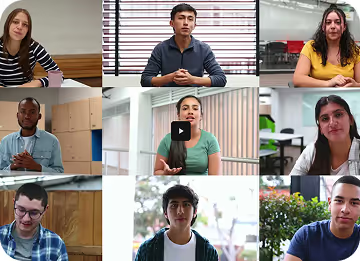SPOC
Introduction to Quantum Computing
Learning Platform
MIT xPRO Learning Platform
Location
Duration
4 weeks
Time Commitment
Sep 29, 2025
-
Oct 27, 2025
Learning Platform
MIT xPRO Learning Platform
Location
Duration
4 weeks
Upcoming Sessions
Sep 29, 2025
-
Oct 27, 2025
Outcomes
Learning Outcomes
Understand quantum computing fundamentals and history.
Differentiate classical vs quantum computing systems.
Apply quantum gates and operations in algorithms.
Analyze various qubit modalities and their robustness.
Address challenges like decoherence in quantum systems.
Implement the Deutsch-Jozsa algorithm on a quantum computer.
Use quantum software tools like OpenQASM for programming.
Explore quantum communication protocols and key distribution.
Compare industry approaches to quantum computing advancements.
Gain hands-on experience with the IBM Quantum Experience.
You Will Get
Official Certificate From MIT
.avif)
Live Interactive Sessions

Modules
Introduction to Quantum Computing
In this module, students will explore the historical context of quantum computing, fundamental quantum concepts, and introductory quantum algorithms.
- Overview of classical and quantum computing systems.
- Historical development of electronic computing leading to quantum computing.
- Introduction to quantum gates and their functionality.
- Comparison of classical and quantum algorithms, including universal quantum algorithms.
- Introduction to quantum simulation, emulation, and annealing techniques.
- Activities: Complete "Check Your Understanding" questions and graded exercises.
Leading Qubit Modalities
Students will learn about the physical realization of quantum computers, qubit modalities, and challenges such as decoherence in quantum systems.
- Criteria for good qubit modalities in quantum systems.
- Understanding qubit robustness and the impact of decoherence.
- Overview and comparison of various qubit modalities.
- Case Studies: Detailed exploration of trapped-ion and superconducting qubit quantum computers.
- Activities: Complete "Check Your Understanding" questions, graded exercises, and case studies.
Applications of Quantum Information
This module introduces students to quantum algorithms, quantum communication, and the role of quantum computing in industry.
- Exploring quantum algorithms and their potential computational speed-up (quantum advantage).
- Fundamentals of quantum communication protocols, including quantum key distribution.
- Case Study: Perspectives from leading quantum computing companies (IBM, Google, Microsoft, and others).
- Deep dive into computational complexity as it relates to quantum systems.
- Activities: Complete reflection and review exercises, peer review tasks, and graded activities.
A Simple Quantum Algorithm in Practice
Students will implement quantum circuits and algorithms, particularly focusing on the Deutsch-Jozsa algorithm using quantum software tools.
- Comparison of classical and quantum circuit models.
- In-depth study of the Deutsch-Jozsa algorithm and its applications in quantum computing.
- Introduction to quantum programming with OpenQASM and its graphical interface.
- Hands-on experience with the IBM Quantum Experience, implementing the Deutsch-Jozsa algorithm on a real quantum computer.
- Activities: IBM QE practicum, graded activities, post-assessment, and course wrap-up.
Academic Team
Testimonial
"The course allowed me to put new knowledge into practice immediately through assignments, which deepened my understanding. The professors offered valuable insights and broadened my perspective, making the learning journey truly enriching."
.avif)
FAQs
Still have questions?
Will I receive any instructions after booking my interview?
Yes. Once your interview time is confirmed, you’ll receive detailed preparation guidance from the admissions committee to help you get ready.
What can a program advisor help with? Who are they?
Our program advisors are full-time team members with at least a master’s degree from top universities like Harvard University and Stanford University. They’ve helped thousands of students plan their paths—and they’re here to help you, too.
By understanding your background, goals, and questions, they can:
- Suggest the best-fit PBL and SPOC projects
- Help you build a strong application strategy
- Create a learning plan that matches your goals
Not sure if you're a fit yet? They’ll be honest with you. No pressure, no wasted time—just clear, helpful advice to move forward with confidence.
What should I include in my self-introduction?
You are encouraged to share your story, including but not limited to:
- Basic Information
- Educational History
- Relevant Project Experience
- Future Goals and Areas of Interest
- Top 3 PBL Courses of Interest
- Soft Skills
What questions should I expect during the interview?
Expect questions about your learning goals, learning strategy, interest areas, teamwork experiences, and motivation to join the program. When it comes to discussing specific SPOCs or PBLs, questions may also touch on your existing skills or relevant knowledge.
When and where do I submit my materials?
- Live Video Interview: Email materials to application@blendedlearn.org within 24 hours of your interview with the email subject: [Your Full Name] — AI+X Research Plan Admission Application
- Self-Paced Video Interview: Submit materials through the guided interview form.
Can I submit an unofficial transcript?
Yes, unofficial transcripts are accepted.
Do I need coding experience to apply?
No. There are no coding prerequisites. We welcome students from all academic backgrounds. Our projects have varying levels of difficulty, but our academic staff works with beginners to place them on teams with more skilled learners and prepare project leads to teach to their level. If you have any questions or concerns, please contact your Program Advisor.
Do I need an English test score (like GRE, TOEFL, IELTS)?
No. We believe language is a vital tool for learning and connection—but it shouldn’t be a barrier to accessing opportunities in AI+X. That’s why we do not require any English test scores. As long as you’re able to learn and communicate in English—whether naturally or with the help of AI tools—you’re welcome to apply.
Is there an age requirement for the program?
Yes. You must be at least 18 years old to join the on-campus experience. Exceptions apply for learners who are only participating in online learning.
I’m a freshman—how can I stand out when competing with more senior applicants?
You’re not at a disadvantage. Many of our participants are first- or second-year students who join to explore new fields, gain hands-on experience, and collaborate with peers from diverse backgrounds. In fact, starting early can be a unique advantage—it gives you more time to build skills, clarify direction, and benefit from the experience.
Our admissions team focuses on fit, not seniority. We look at how well the program aligns with your current goals and stage of growth. We assess each applicant within the context of their background, academic year, and potential, not by comparing freshmen to seniors or professionals. Show your initiative and curiosity—we’re looking for students ready to grow, wherever they are in their journey.
Who will review my application?
Your application will be reviewed by our admissions committee, which includes faculty, program alumni, industry partners, PBL academic coordinators, program advisors, and mentors.
Are seats limited every year?
Yes. To ensure a high-quality, collaborative learning experience, each PBL cohort is limited to 30 students and runs 3–5 times per year. Seats are offered on a first-come, first-served basis within the community. Once enrolled, you’ll gain access to your learner dashboard, where you can register for SPOCs and PBLs and manage your learning journey.
What if there’s no exact start date for the PBL projects I’m interested in?
At BlendED, we do our best to accommodate each learner and the academic team's preferred schedule. By using the "REQUEST" function in your dashboard, you can indicate your preferred start date for the next round of PBLs. So if your desired project isn't currently open, no worries—we'll help you join the waitlist and prepare for the next opportunity.
If I’m accepted, when will my learning plan begin?
If admitted, your learning plan officially begins with the start date of your first selected SPOC or PBL, NOT at the time of enrollment confirmation.
Why don’t you require English test scores (GRE, GMAT, IELTS, TOEFL)?
According to UNESCO and OECD, over 70% of college students worldwide are non-native English speakers. As AI advances, we believe language should no longer be a barrier to learning AI+X together on a global scale.
At BlendED, we embrace technology. As long as you’re adaptive and able to communicate effectively—with or without the help of AI tools—you’re welcome here. What matters most is your ability to learn, contribute, and grow in a collaborative environment.
Explore SPOCs
View All SPOCsTransform Your Future with AI+X
Take control of your learning and start building your AI+X expertise.
.svg)


.svg)

.avif)






